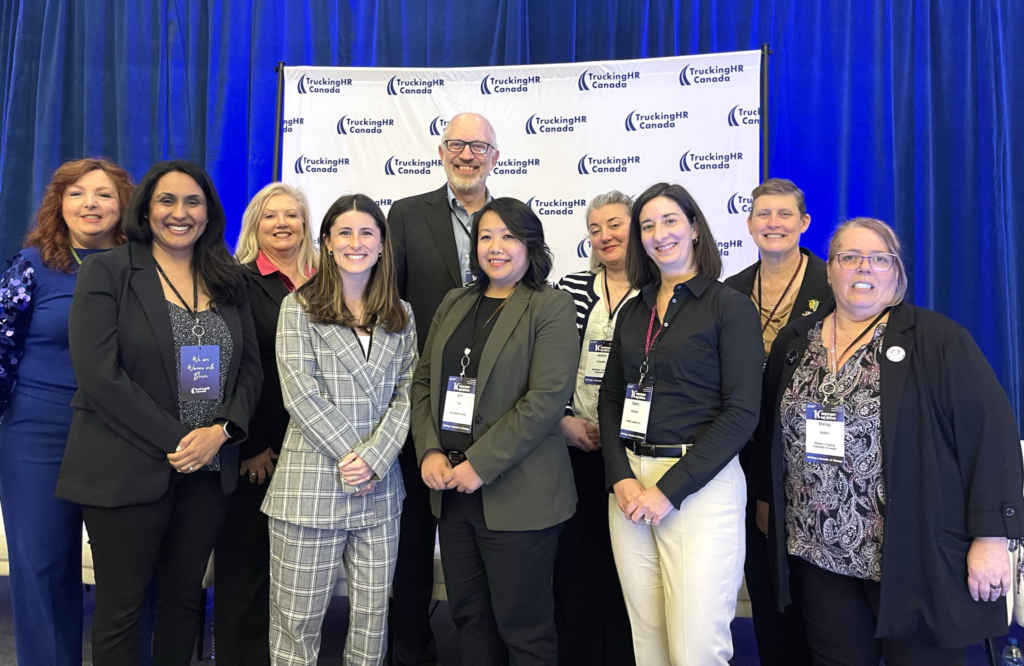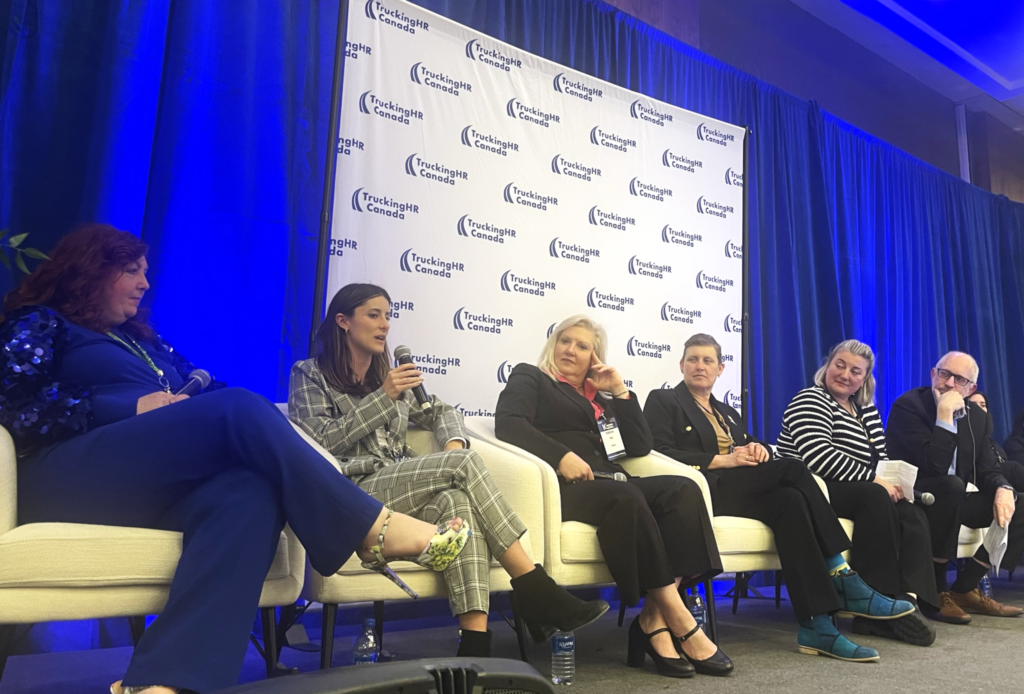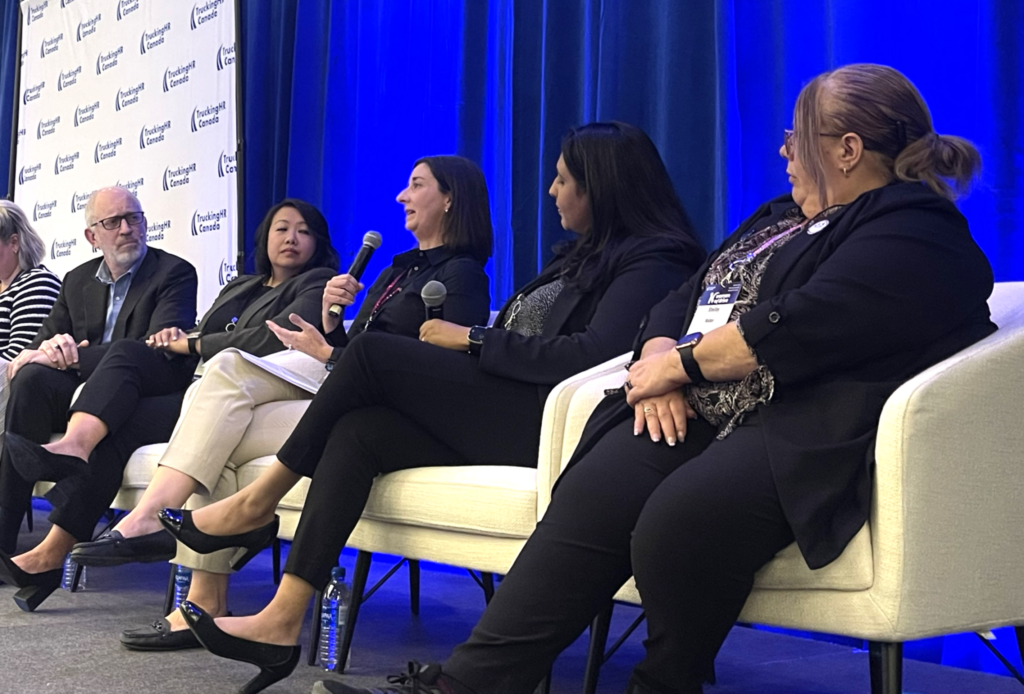These are the challenges women in trucking face
“Little little lady, you know, this is a very advanced job.”
This was the response Shelley Walker heard on her first interview to become a truck driver when she expressed interest in the job. This is only one of the examples of the backlash that women experienced in transportation just over a decade ago.

“The next day, I went to a different company, I interviewed, and I got the job. And that’s when I started, and that same company trained me and helped me get my A-class licence. And life from there was just really good,” recalls Walker. Since then, she has become a recognized, respected voice in the industry, and is the CEO of the Women’s Trucking Federation of Canada.
The industry has become much more welcoming to women, but there is still work to be done, said the panelists during the 10 Years – 10 Perspectives panel at the Trucking HR Canada’s Women with Drive leadership summit in Toronto, on March 7. The panel featured women in different trucking sectors across the country.
Introduction to the industry
The panelists reflected on their experience in the industry, saying that some joined trucking by coincidence, some by choice, and others due to family influence or as a second career. Each of them has a different story to tell, but all of these women have two things in common.
They all had challenges to overcome. But even despite the bumps on the road, they chose to stay in the industry because of the people and the chance to have an impact on the communities.
Hannah MacDonald-Dannecker, sales and marketing manager and partner at the Better Together Group of Companies, decidedly did not want to be a part of transportation growing up because she was raised in the industry, watching parents working hard and long hours. But things changed during the pandemic when MacDonald-Dannecker realized the essentialness of trucking.
“I ended up falling in love with it and I wouldn’t change it for anything.”

Ruby Murphy-Collins, chief operating officer of Armour Transportation System, also recalls joining the transportation industry in the 90s when she was looking for a job.
“The day I walked into that organization, I came alive, it was exciting. It was chaotic. It was energetic and I was needed,” she said. “I fell into it by accident. And I stayed in it by choice.”
Angelique Magi, the vice-president and head of insurance at Element Fleet Management, who originally started in the insurance business, says the feeling of community was what made her stay involved with transportation.
“The company had at that time, wanted a woman to take over that role [of transportation practice]. And the aptitude was more than the actual technical experience because we have plenty of technical underwriters,” she recalls.
“But what I did find is that when I landed in that position, I was able to be myself in business, and I was able to be myself with the people that I was working with in business and that was a first in the financial services area. So, once I felt that, I never looked back.”
And despite all the positives the industry has to offer, everyone on the panel had a story or two to share about the challenges they had to overcome. Some of those remain ongoing to this day.
Challenges
Helen Thorpe started her career driving a truck after she was laid off from a previous job. Since then, she changed roles working for dispatch, and she is currently a safety and fleet maintenance specialist at FedEx Ground. Her experience was similar to Walker’s.
Thrope recalls most of the men she worked with were supportive. But there were some drivers sharing their unwanted opinions, telling her she ‘did not have what it takes’ to be in trucking, advising that she’d be a better fit in the kitchen.
Deep Grover, however, did want to hear her employer’s feedback about why she was not fit for the job she wanted.
Currently serving as an occupational health and safety advisor for the SafetyDriven-Trucking Safety Council of B.C., Grover recalls she had to interview three times to get a job in a department different from the one she was working in at that time.
“It took a lot of perseverance and it took a lot of resilience,” says Grover, adding she never received feedback on why she was denied the job the first two times.
“I remember co-workers and supervisors laughing at me and saying, ‘Quit, you’re not going to get the job.’” She says even though the interviewers never commented on her professional skills, to her, it was obvious she was denied an opportunity because of her gender and cultural background.
Stacey Rumley, HR director at Trailcon, has a different story to share.

She recalls having pleasant experiences during her career and is grateful to the male and female mentors she has had. But still, she remembers when she felt the difference in how female professionals were viewed in the industry compared to men.
“Sometimes I just had to fight twice as hard to be heard or seen at the table,” she says, citing an example of when one of the senior vice-presidents commented on her job, calling human resources ‘fluff’.
Mansplaining
Anh Thai has a similar experience. The director of marketing at The Fastfrate Group remembers having great mentors in her career, but ever since she was recruited in the industry she had to deal with mansplaining from colleagues, even though the term did not yet exist.
Thai also recalls she and other women were constantly asked to take notes during meetings.
“I was the younger one in the room and I had more to learn. So, I’d take notes. And then I would go to another meeting, and then someone else was in the room – female – and she was taking notes. And then I started observing and realizing that no one man has ever taken a note,” she said, adding that she learned to deal with these things as she gained more confidence in the boardroom.
“I now have the competence to just basically say, ‘I’m already taking notes so I can definitely share all my notes for you. They may be a little bit more marketing-centric, but I can definitely share my notes with you guys.”
Standing up for yourself
Standing up for oneself was a skill Hannah MacDonald had to learn as well. She says like in any industry, women have to deal with objectification, which is not always expressed verbally alone.
“I have a very vivid memory of walking into a meeting and blocking a phone number, blocking an email, and feeling a little just uncomfortable,” she says. “The way that their eyes hit me, the way that their words came into my ears…I didn’t know what to do. I didn’t know how to behave. I didn’t know how to carry forward in a way and that spoke well on my family’s business name.”
And even though she realized controling people’s behavior was not possible, what she could do was control her words and responses.
“I can take that as a compliment. I appreciate your words, but also if you say something like this, again, I’ll never speak to you.” This is one of the things she had to practice saying. “For junior people, it can be hard, it can be scary and so overwhelming, but it’s so important to learn how to do it.”
Jessica Cranmer, the sector council program manager for the Manitoba Trucking Association, added that the biggest challenge she keeps seeing in the industry is that women’s empathy is perceived as weakness.
But empathy, in fact, is one of the skills that makes a better leader. And nowadays, companies understand that and take action to recruit and retain women.
What now?
While women currently make up just over 4% of truck drivers in Canada, the country has seen a 43% increase in female truckers in 2021, compared to 2016. Overall, over 26,000 women were employed in the trucking and logistics sector two years ago, Trucking HR Canada’s latest report says.
However, the industry needs to continue its efforts to attract women in both driving and non-driving positions.
Walker says it is important to reach out to children in schools and educate them on various opportunities in trucking, as not everyone is aware there is more to it than driving a truck.
MacDonald-Dannecker agrees.
“I actually think there’s a communication shortage. I don’t think that there is a lack of people looking to work and I don’t think that there’s a lack of jobs. But I do think that there is a lack of communication between the two people groups,” she says, adding that efforts to reach out to future workforce should begin at earlier ages.
“[What] I’m personally working on right now is trying to get a truck driver Barbie, because kids are making decisions by the age of six, and at age 12 that starts to solidify.”
Have your say
This is a moderated forum. Comments will no longer be published unless they are accompanied by a first and last name and a verifiable email address. (Today's Trucking will not publish or share the email address.) Profane language and content deemed to be libelous, racist, or threatening in nature will not be published under any circumstances.

I’m a MELT instructor in Alberta and here are a few comments about women in the trucking industry. My experience is that women a far more conscientious than men when it comes to things like pre-trip inspections, log book rules, documentation etc. They are also more risk adverse than men which is a good thing. Keeps one out of the ditch upside down. As a former owner operator I would prefer a woman in my truck anytime. They are much easier on equipment.
Women do have different needs than men but carriers are slow to recognize these thus the small number of women. And don’t read that as special just different.
Women for the trucking industry is the biggest untapped resource to elevate the driving shortage